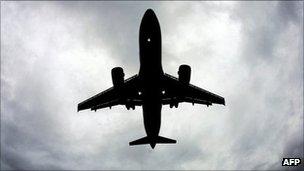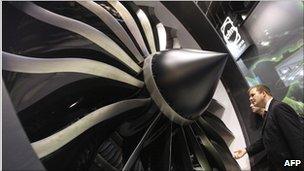Court adviser says EU airline carbon cap would be legal
- Published

The EU airline emissions scheme is due to begin in January 2011
Plans to include any airline landing or taking off on EU territory in an emissions trading scheme are legal, an adviser to Europe's top court has said.
European Court of Justice Advocate General Juliane Kokott said this in response to a legal challenge to the scheme by North American airlines.
Though the court will not rule until next year, it follows the advocate-general's opinion in most cases.
The new emissions scheme is due to be begin in January.
It is an extension of the EU's 2003 scheme for trading in greenhouse gas emission allowances, a key part of Europe's climate change policy.
Critics argue that under the 1997 Kyoto climate pact, countries agreed to address emissions from aviation jointly through the UN's aviation body, the International Civil Aviation Organization (ICAO).
However, negotiations there have yet to yield progress.
It is estimated that aviation accounts for 3% of total carbon dioxide emissions while airlines pay no tax on fuel.
'Disappointed'
Ms Kokott said the EU was within its rights to act unilaterally.
"The inclusion in the EU emissions trading scheme of flights of all airlines from and to European airports is compatible with the principle of fair and equal opportunity laid down in the Open Skies Agreement," she said.
"Indeed it is precisely that inclusion that establishes equality of opportunity in competition, as airlines holding the nationality of a third country would otherwise obtain an unjustified competitive advantage over their European competitors if the EU legislature had excluded them from the EU emissions trading scheme."
Welcoming her recommendation, European Climate Commissioner Connie Hedegaard said the EU wished to "engage constructively with third countries during the implementation of the legislation".
Bill Hemmings, programme manager of environmental lobby group Transport & Environment, said: "The aviation industry should be tackling climate change with engineers, not lawyers."
A group of US and Canadian-based airlines and airline associations had challenged UK measures to implement the scheme at the High Court in London, which in turn asked the ECJ to deliberate.
UK Energy and Climate Change Minister Greg Barker welcomed the Luxembourg court adviser's opinion, saying both the UK and EU would continue to "robustly defend" the emissions trading system.

New engines are designed to reduce fuel use
"The aviation industry, in the same way as other industries, needs to play its part in reducing emissions," he added.
Expressing disappointment, the International Air Transport Association (IATA) said the debate was not over yet.
"It is only part of a complex set of developments," said Tony Tyler, the IATA's director-general and CEO.
"We support and need positive economic measures as part of our strategy to manage aviation's emissions," he was quoted as saying by Reuters news agency.
"But it must be a global scheme under the leadership of ICAO."
While lawyers expect the London High Court to respect the ECJ's ruling, some predict the fight may go on.
"I suspect it is a bit early to say that the airlines have lost this case," said Peter Zaman, a partner at law firm Clifford Chance in London.
- Published21 December 2011
- Published6 June 2011